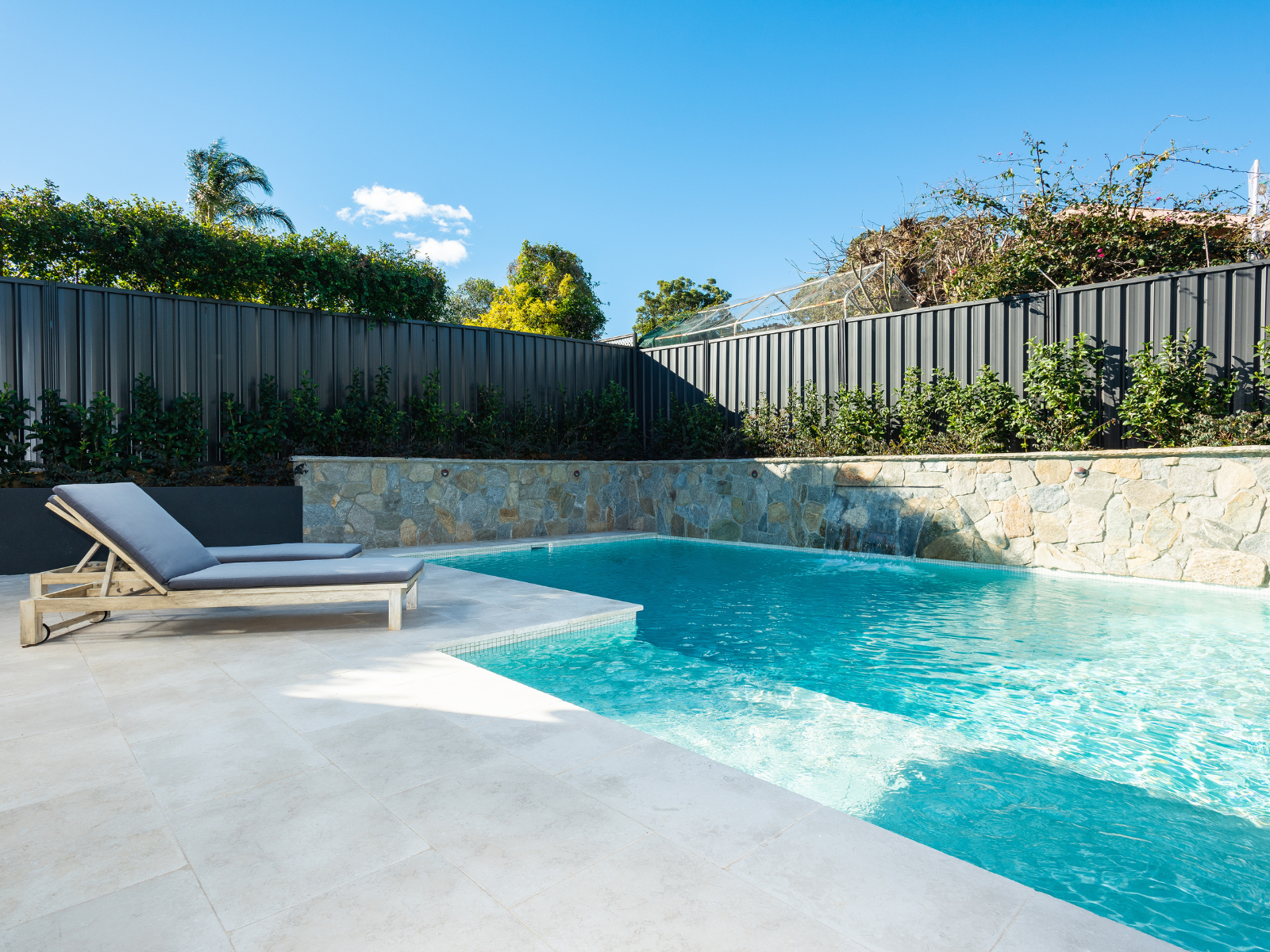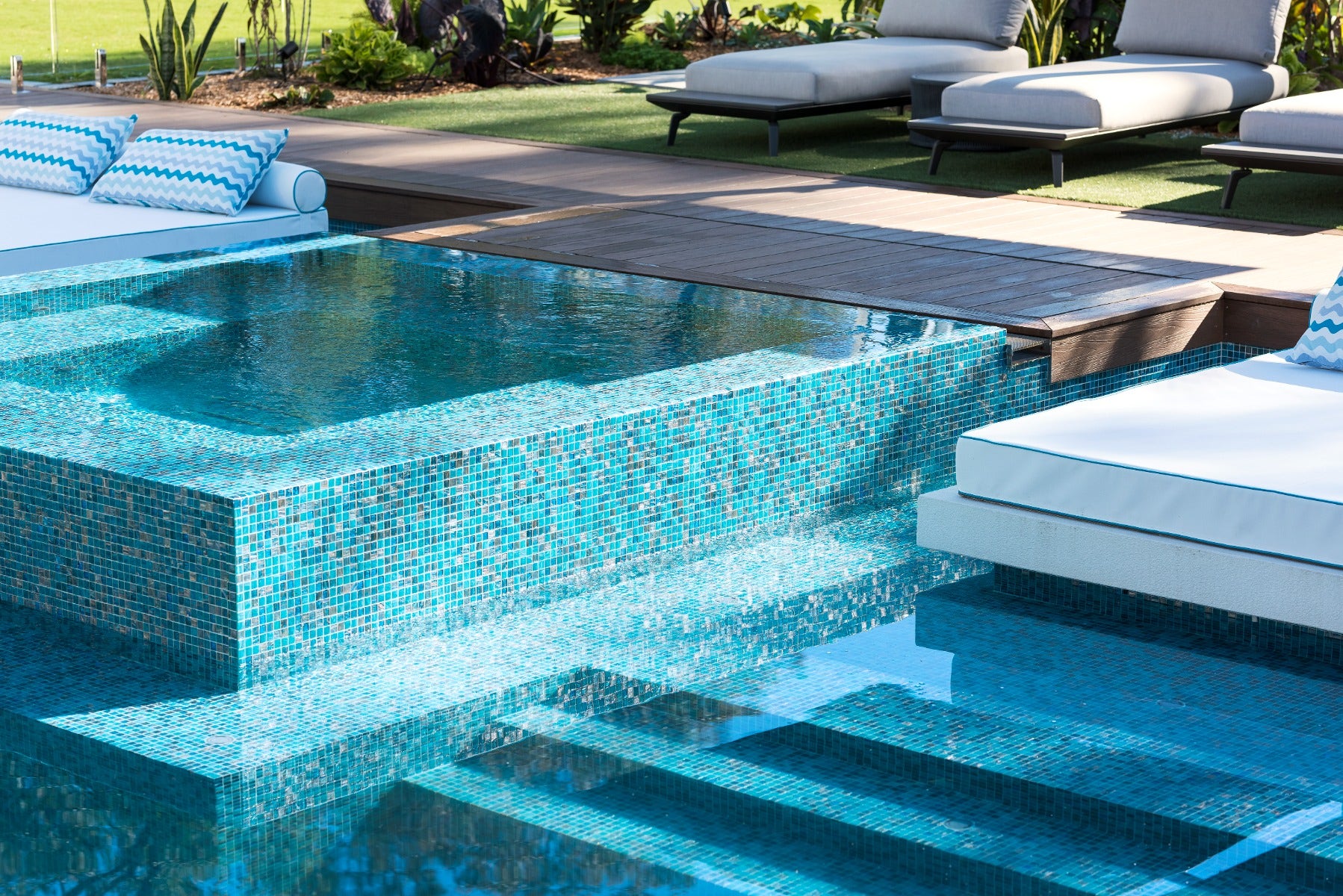Articles
Glass vs Ceramic Pool Tiles: What Are the Differences?
30.05.24
Gone are the days of pool noodles and inflatable flamingos – the key to a backyard that turns heads these days lies beneath the water's surface: the tiles!
The battle between glass vs ceramic pool tiles is a common one, and for good reason. They both have distinct advantages.
In this blog, we'll help you avoid designing dead ends and pick the perfect tile to transform your dream pool into a stunning retreat that'll have the whole neighbourhood talking (in a good way, of course).

Overview of Pool Tiles
he Romans used tiles in pool design over 2,000 years ago. They adorned their baths with intricate mosaic designs using vibrant tiles. Early mosaics were often crafted from stone or ceramic, and their primary purpose was to beautify the bathing experience.
Today, glass and ceramic pool tiles continue this legacy, offering a stunning and durable solution for modern pool designs.
Glass tiles, in particular, have become increasingly popular due to their unique ability to reflect light and create a shimmering, jewel-toned appearance. This effect is especially captivating in sunlight, where the pool water takes on a shimmering quality.
Ceramic tiles, on the other hand, offer a more traditional aesthetic that is ideal for classic or Mediterranean-inspired pool designs.
Glass Pool Tiles
Glass pool tiles captivate with their undeniable glamour. Available in a kaleidoscope of colours and finishes – from classic blues and serene greens to dazzling iridescence and mirrored options – they create a truly breathtaking visual effect. Unlike ceramic, glass allows light to penetrate, imbuing your pool water with a captivating depth and sparkle.
But beyond aesthetics, glass tiles shine in terms of functionality. They are exceptionally durable, easily shrugging off scratches, fading, and chemical wear. Their non-porous surface repels stains like a champion, making cleaning a breeze. Simply wipe them down with a soft cloth and mild detergent to maintain their pristine look.
However, when considering glass pool tiles vs ceramic pool tiles, it's important to acknowledge some factors. Glass pool tiles tend to have a higher initial cost compared to ceramic options. Additionally, installation requires a more skilled hand due to the delicate nature of the material.

Porcelain Pool Tiles
Porcelain pool tiles offer the charm of traditional pool designs. They come in a vast array of colours, textures, and patterns, allowing you to achieve a classic or contemporary aesthetic. From smooth, glazed finishes to textured options that mimic natural stone, ceramic tiles provide immense design flexibility.
A significant advantage of ceramic pool tiles, especially when compared to glass pool tiles, is their cost-effectiveness. They are generally more affordable and are relatively easy to cut and install. This makes them a popular choice for DIY enthusiasts or those working with a tighter budget.
The trade-off to consider with ceramic tiles is their porosity. While glazed ceramic tiles offer good resistance to water absorption, unglazed options can absorb water over time, potentially leading to cracking and staining. Additionally, the glaze can wear down over the years, requiring more frequent maintenance compared to glass tiles.

Key Differences
Now that we've explored the unique characteristics of both options let's delve deeper into the key factors that differentiate glass pool tiles from ceramic pool tiles:
Aesthetic Differences
- Glass: Creates a luxurious, shimmering look with captivating depth and vibrancy.
- Porcelain: Offers a timeless appeal with a wide range of colours and textures for a highly customisable design.
Durability and Longevity
- Glass: Highly resistant to scratches, fading, and chemicals.
- Porcelain: Durable, but glazed surfaces can wear down over time. Unglazed options are more susceptible to water absorption and cracking.
Maintenance and Cleaning Requirements
- Glass: Low maintenance; easy to clean with a soft cloth and mild detergent.
- Porcelain: Requires regular cleaning to prevent stains. Glazed surfaces are easier to maintain, while unglazed options might need sealant for added protection.
Installation Challenges
- Glass: Requires more expertise due to the delicate nature of the material.
- Porcelain: Relatively easy to cut and install.
Cost Implications
- Glass: Generally more expensive than ceramic tiles.
- Porcelain: Cost-effective option.
Suitability for Different Climates and Pool Types
- Glass: Ideal for all climates due to its high resistance to fading and chemicals. Well-suited for modern pool designs and infinity pools where a luxurious look is desired.
- Porcelain: Works well in most climates, but consider using glazed options in freeze-thaw zones. Suitable for a variety of pool types, from classic rectangular shapes to more intricate designs.
FAQs About Glass vs Ceramic Pool Tiles
What Is the Difference Between Ceramic and Glass Tile?
Glass tiles are made from molten glass, while ceramic tiles are formed from fired clay. Glass is non-porous and highly resistant to staining, while ceramic tiles can be slightly porous depending on the glaze.
Which Is Better, Glass or Porcelain Pool Tile?
Both glass and porcelain tiles are excellent choices for pools. Glass offers a more luxurious look and superior stain resistance, while porcelain can be slightly more durable and affordable. The best choice depends on your specific needs and priorities.
What Type of Pool Tile Is the Best for Swimming Pools?
The best type of pool tile for swimming pools is typically porcelain, ceramic, or glass tiles due to their durability, resistance to water absorption, and wide range of design options. Natural stone tiles liketravertine or slate are also popular for their elegance but may require more maintenance. Ultimately, the ideal choice depends on factors such as aesthetics, durability, and maintenance preferences.
Dive Into the Details: A Clear Cut Conclusion on Glass vs Ceramic Pool Tiles
So there you have it! We unveiled the distinct personalities of glass and ceramic pool tiles. The perfect choice hinges on your vision and needs.
Here is a brief recap:
Glass pool tiles are the epitome of luxury. They mesmerise with their sparkling beauty and unparalleled stain resistance. Their low-maintenance nature makes them ideal for busy homeowners. However, their initial cost and installation complexity require careful consideration.
Ceramic pool tiles, on the other hand, offer timeless elegance and budget-friendly charm. The vast array of colours, textures, and ease of installation make them a popular choice for DIY enthusiasts. Remember, while glazed ceramic tiles offer good durability, they might require more frequent maintenance compared to glass.
No matter your vision, you're in good hands with Amber Tiles! Explore our stunning selection of both glass and ceramic pool tiles to find the perfect complement for your dream pool.
Contact our specialists today for expert advice and transform your backyard into a shimmering oasis.

